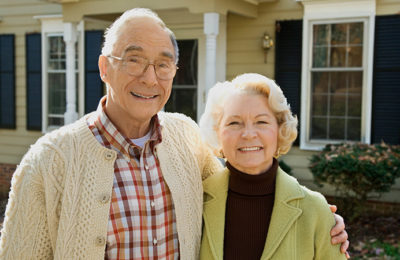What is a Reverse Mortgage?
A reverse mortgage is a type of loan that is funded using the equity that has built up in a home. A reverse mortgage is designed to be an effective solution for senior homeowners who are short on money or simply wish to supplement their retirement income. This is vastly different from a traditional mortgage loan because payments don’t have to be made on a reverse mortgage until the borrower decides to sell the house and move out or they have passed away. This has helped many people in the older generation solve their problems with cash flow, reach their financial goals, and live a higher quality of life.
How Does a Reverse Mortgage Work?

What is a reverse mortgage? A reverse mortgage can offer a variety of financial benefits to homeowners aged 62 and up.
The concept behind reverse mortgages is a fairly simple one. Once a borrower has gone through the proper channels to apply for the loan and has been approved, they can choose to receive a lump sum of money at one time, a line of credit, or a steady stream of monthly payments. If there is an outstanding mortgage balance on the property, the homeowner must pay that off before using the funds for anything else. Then, the remaining proceeds can be spent in any manner without restriction. In contrast to a standard loan, a reverse mortgage will accumulate interest over time, but the borrower will never be responsible for paying back more than the home is worth at the time the loan is due.
Reverse Mortgage Eligibility Requirements
To be eligible for a reverse mortgage, the borrower is required to be at least 62 years old and own the home they want to use as collateral. In addition, they must continue to pay property taxes and homeowners insurance, as well as maintain the property in good condition. Single-family residences most commonly qualify for reverse mortgage loans, but in some cases, condos, townhouses, two-to-four unit properties, and manufactured homes will also be considered.
Factors That Determine How Much a Reverse Mortgage is Approved For
The amount approved for a reverse mortgage will depend on a variety of factors. This includes the appraised value of the property, amount of home equity that has accrued, maximum lending limit, age of the homeowner, and current interest rate. It’s important for borrowers to realize they won’t be able to take out a loan for the full amount of equity they have available or the full value of the home, as it’s necessary to keep some home equity in order to retain homeownership.
A reverse mortgage opens up a number of possibilities for elderly homeowners while allowing them to stay in the same home they’ve spent years building a life in. Once they understand what a reverse mortgage loan is and how they work, they can make an informed decision on whether or not it’s right for their particular situation.
If you are considering a reverse mortgage, it’s important to talk to a qualified reverse mortgage professional. A good place to start is our list of leading reverse mortgage agents.







